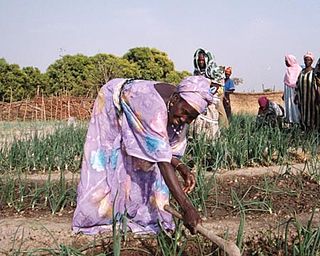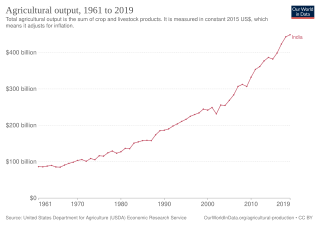Agribusiness is the industry, enterprises, and the field of study of value chains in agriculture and in the bio-economy, in which case it is also called bio-business or bio-enterprise. The primary goal of agribusiness is to maximize profit while satisfying the needs of consumers for products related to natural resources such as biotechnology, farms, food, forestry, fisheries, fuel, and fiber.
The Agricultural Marketing Service (AMS) is an agency of the United States Department of Agriculture; it maintains programs in five commodity areas: cotton and tobacco; dairy; fruit and vegetable; livestock and seed; and poultry. These programs provide testing, standardization, grading and market news services for those commodities, and oversee marketing agreements and orders, administer research and promotion programs, and purchase commodities for federal food programs. The AMS enforces certain federal laws such as the Perishable Agricultural Commodities Act and the Federal Seed Act. The AMS budget is $1.2 billion. It is headquartered in the Jamie L. Whitten Building in Washington, D.C.

The National Dairy Development Board (NDDB) is a statutory body set up by an Act of the Parliament of India and an Institution of National Importance. It is under administrative control of the Ministry of Fisheries, Animal Husbandry and Dairying of the Government of India. The main office is in Anand, Gujarat with regional offices throughout the country. NDDB's subsidiaries include Indian Dairy Machinery Company Ltd (IDMC), Mother Dairy and Indian Immunologicals Limited, Hyderabad, NDDB Dairy Services, NDDB Mrida Ltd., NDDB CALF Ltd. The Board was created to finance and support producer-owned and controlled organisations. Its programmes and activities seek to strengthen farmer cooperatives and support national policies that are favourable to the growth of such institutions. Cooperative principles and cooperative strategies are fundamental to the board's efforts.

An agricultural cooperative, also known as a farmers' co-op, is a producer cooperative in which farmers pool their resources in certain areas of activities.
The Commodity Credit Corporation (CCC) is a wholly owned United States government corporation that was created in 1933 to "stabilize, support, and protect farm income and prices". The CCC is authorized to buy, sell, lend, make payments, and engage in other activities for the purpose of increasing production, stabilizing prices, assuring adequate supplies, and facilitating the efficient marketing of agricultural commodities.

The National Bank for Agriculture and Rural Development (NABARD) is an All India Financial Institution (AIFI) and an apex Supervisory Body for overall supervision of Regional Rural Banks, State Cooperative Banks and District Central Cooperative Banks in India. It was established under the NABARD Act 1981 passed by the Parliament of India. It is fully owned by Government of India and functions under the Department of Financial Services (DFS) under the Ministry of Finance.

The history of agriculture in India dates back to the Neolithic period. India ranks second worldwide in farm outputs. As per the Indian economic survey 2020 -21, agriculture employed more than 50% of the Indian workforce and contributed 20.2% to the country's GDP.

Many farmers in India depend on animal husbandry for their livelihood. In addition to supplying milk, meat, eggs, wool, their castings (dung) and hides, animals, mainly bullocks, are the major source of power for both farmers and dairies. Thus, animal husbandry plays an important role in the rural economy. The gross value of output from this sector was 8,123 billion Rupees in FY 2015–16.
Uganda's favorable soil conditions and climate have contributed to the country's agricultural success. Most areas of Uganda have usually received plenty of rain. In some years, small areas of the southeast and southwest have averaged more than 150 millimeters per month. In the north, there is often a short dry season in December and January. Temperatures vary only a few degrees above or below 20 °C but are moderated by differences in altitude.

Benin is predominantly a rural society, and agriculture in Benin supports more than 70% of the population. Agriculture contributes around 35% of the country's gross domestic product (GDP) and 80% of export income. While the Government of Benin (GOB) aims to diversify its agricultural production, Benin remains underdeveloped, and its economy is underpinned by subsistence agriculture. Approximately 93% of total agricultural production goes into food production. The proportion of the population living in poverty is about 35.2%, with more rural households in poverty (38.4%) than urban households (29.8%). 36% of households depend solely upon agricultural (crop) production for income, and another 30% depend on crop production, livestock, or fishing for income.

The economy of the Indian state of Andhra Pradesh is primarily dependent on agriculture, which directly and indirectly employs 62% of the population. GSDP as per the first revised estimate, for the year 2023-24 is ₹15,40,000 crore.The state is ranked 1st in the country for the year 2021-22 in terms of the Gross State Domestic Product (GSDP) growth at constant prices with growth rate of 11.43%. The state GSDP is expected to grow at a rate of 17% for the year 2023-24.

Agriculture in Cyprus constituted the backbone of its economy when it achieved its independence in 1960. It mostly consisted of small farms, and sometimes even subsistence farms. During the 1960s, irrigation projects made possible vegetable and fruit exports; increasingly commercialized farming was able to meet the demands for meat, dairy products, and wine from the British and United Nations troops stationed on the island and from the growing number of tourists.
Despite the crisis in Syria, agriculture remains a key part of the economy. The sector still accounts for an estimated 26 percent of gross domestic product (GDP) and represents a critical safety net for the 6.7 million Syrians – including those internally displaced – who still remain in rural areas. However, agriculture and the livelihoods that depend on it have suffered massive losses . Today, food production is at a record low and around half the population remaining in Syria are unable to meet their daily food needs.

REC Limited, formerly Rural Electrification Corporation Limited, of which Power Finance Corporation Limited (PFC) is the holding company of that is under the ownership of the Ministry of Power, the Government of India. It finances and promotes power projects across India. The PSU provides loans to Central/State Sector Power Utilities in the country, State Electricity Boards, Rural Electric Cooperatives, NGOs and Private Power Developers. On 20 March 2019, PFC signed an agreement to acquire a 52.63% controlling stake in REC for ₹14,500 crore (US$1.7 billion). On 28 March, PFC announced that it had completed making the payment for the acquisition and intended to merge REC with itself in 2020. However, REC has maintained that merging PFC-REC is no longer an option.
The Ministry of National Food Security & Research or Ministry of Agricultulre (Urdu: وزارتِ برائے قومی تحقیق و حفظانِ تغذیہ ، پاکستان, wazarat-e- baraye qaumi tehqeeq o hfzanِ taghzia, Pakistan is a Cabinet-level ministerial department of Government of Pakistan. It is responsible for implementing, enforcing, developing, and executing policies on agriculture, rice, livestock, fishing, and farming. The ministry is governed by the Minister of National Food Security and Research, who must be a member of Parliament of Pakistan. According to the World Food Programme, "36.9% of [Pakistan's] population faces food security. This is due to limited economic access by the poorest and most vulnerable group of the population – particularly women – to an adequate and diverse diet."
The Madhya Pradesh Rural Livelihoods Project (MPRLP) works with local village assemblies, Gram Sabha, to facilitate and guide community-driven collective and individual action to reduce poverty in the state of Madhya Pradesh, India.
StarAgri is an India based agricultural marketing company providing warehousing, procurement and Collateral Management of Agri-Commodities. StarAgri was established in April 2006 by former ICICI Bank associates and has a presence at 190 locations across 16 Indian states. It has 800 agri commodity warehouses under its control, with a cumulative capacity of around 1.2 million metric tons. The number of employees at the company is over 500.StarAgri has five post-harvesting focus areas: agri-warehousing, procurement, collateral management, lab testing and logistics. A bulk of its revenues (65%) are derived from warehousing services.

The Housing and Urban Development Corporation Limited, abbreviated as HUDCO, is an Indian public sector undertaking engaged in housing finance and infrastructure project finance. The Govt Grants Navratna Status to PSU on April 18,2024.
In Sri Lanka, a Non-cabinet minister is politician who is a Minister, but not a member of the Cabinet of Ministers. A non-cabinet minister is ranked below a cabinet minister, but above a deputy minister. A non-cabinet minister can be in charge of a ministry, be attached a ministry of a cabinet minister or be without a ministry. A cabinet minister may hold another non-cabinet minister post with a different subject concurrently.

The Pradhan Mantri Matsya Sampada Yojana (PMMSY)(http://pmmsy.dof.gov.in/) is an initiative launched by the Government of India to establish a comprehensive framework and reduce infrastructural gaps in the fisheries sector. The scheme was announced by the Finance Minister, Nirmala Sitharaman during her speech in the parliament of India while presenting the Union budget for 2019–20 on 5 July 2019. The government intends to place India in the first place in Fish production and processing by implementing Neeli Kranti (transl. Blue Revolution). This scheme is in line with governments aim to double the farmers' income by 2022–23.










